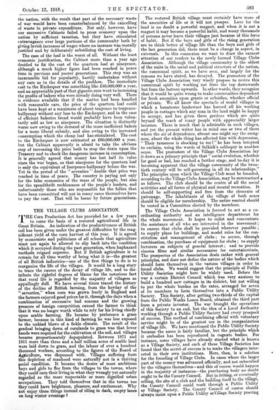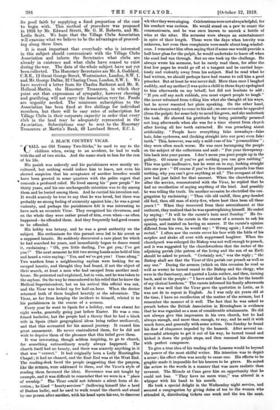THE VILLAGE CLUBS ASSOCIATION.
THE Corn Production Act has provided for a few years to come the basis of a restored agricultural life in Great Britain. An indication of the productiveness of British soil has been given under the greatest difficulties by the mag- nificent yield of the corn harvest of this year. It is agreed by economists and politicians of all schools that agriculture must not again be allowed to slip back into the condition which it occupied during the past generation, when haphazard methods reigned supreme. But if British agriculture is to remain for all time worthy of being what it is—the greatest of all British industries—one of the first things to do is to reorganize the life of the villages. It would be a long story to trace the causes of the decay of village life, and to dis- tribute the rightful degrees of blame for the notorious fact that rural life is regarded by the majority of villagers as appallingly dull. We have several times traced the history of the decline of British farming, from the heyday of the "seventies," when corn was grown freely in England and the farmers enjoyed good prices for it, through the days when a combination of successive bad seasons and the growing pressure of foreign competition caused the farmer to think that it was no longer worth while to rely for his living chiefly upon arable farming. He became by preference a grass farmer, because in this kind of farming he was less exposed to the unkind blows of a fickle climate. The result of the gradual bringing down of cornlanda to grass was that fewer hands were required for the cultivation of the soil, and villages became proportionately depopulated. Between 1871 and 1911 more than three and a half million acres of arable land were laid down to grass, and the labour of over a hundred thousand workers, according to the fig-u, res of the Board of Agriculture, was dispensed with. Villages suffering from this depletion of manhood were naturally not in a thriving *al condition. It became the desire of most ambitious ye and girls to flee from the villages to the towns, where they could earn their living in what they wrongly yet naturally regarded as the more respectable or more dignified urban occupations. They told themselves that in the towns too they could have brightness, pleasure, and excitement. Why not enjoy these things instead of idling in dark empty lanes on long winter evenings ? The restored British village must certainly have more of the amenities of life or it will not prosper. Love for the land is no doubt a powerful magnet, and when it is not a magnet it may become a powerful habit, and many thousands of persons never leave their villages just because of this force of habit. But if the boys and girls of the rising generation are to think better of village life than the boys and girls of the last generation did, there must be a change in aspect, in externals. In this connexion we want to draw the earnest attention of our readers to the newly formed Village Clubs Association. Although the village community is the oldest of the units in the social and political structure of the nation, the communal spirit, as we have seen, and largely for the reasons we have stated, has decayed. The promoters of the Village Clubs Association very wisely propose to revive this communal spirit by working not from the top downwards but from the bottom upwards. In other words, they recognize that it would be quite wrong to make communities dependent for fresh amenities upon grants or subsidies, whether official or private. We all know the spectacle of model villages in which a bounteous landowner has housed all his working people in cottages which any man in the land might be happy to occupy, and has given them gardens which are quite beyond the reach of many people with appreciably larger incomes. There is much that is admirable in such villages, and yet the present writer has in mind one or two of them where the air of dependence, almost one might say the smug- ness, about the whole thing has affected him with depression. "Their tameness is shocking to me L" he has been tempted to exclaim, using the words of Selkirk's soliloquy in another sense. The promoters of the Village Clubs Association lay it down as a primary principle that" social evolution, whether for good or bad, has reached a further stage, and to-day it is becoming apparent that the village community of the twen- tieth century will be self-governing in all its relationships." The principles upon which the Village Club must be founded, according to the Village Clubs Association, may be summarized as follows. The club should be the centre of all the social activities and all forms of physical and mental recreation. It should be self-supporting and free from the elements of patronage. The inhabitants of the village of both sexes should be eligible for membership. The entire control should be vested in a Committee elected by the members.
The Village Clubs Association is formed to act as a co- ordinating authority and an intelligence department for the whole movement. It hopes to enlist and concentrate the assistance of all whiz; are interested in the movement; to ensure that clubs shall be provided wherever possible ; to supply plans for buildings, and model rules for the con- stitution and management of clubs ; to secure, through combination, the purchase of equipment for clubs ; to supply lecturers on subjects of general interest ; and to provide cinema films and similar necessaries for entertainments. The prospectus of the Association deals rather with general principles, and does not define the nature of the bodies which should form themselves in the various villages in order to found clubs. We would suggest that the principle of Public Utility Societies might here be widely used. Before the war a certain District Council which was very anxious to build a hundred new cottages in its district, but not willing to put the whole burden on the rates, arranged for seven of its members to form themselves into a Public Utility Society. This Society, after getting two-thirds of the capital from the Public Works Loans Board, obtained the third part from a private investor. The war brought the operations of this Society to an end, but the idea of a Local Authority working through a Public Utility Society had every prospect of success. This method of combining official with voluntary service might be of the greatest use in the reorganization of village life. We have mentioned the Public Utility Society because the name is fairly familiar, but the principle which it embodies has been reproduced in cognate bodies. For instance, some villages have already started what is known as a Village Society, and each of these Village Societies has found that the secret of success is to make the villagers inter- ested in their own institutions. Here, then, is a solution for the founding of Village Clubs. In cases where the larger part of the money was advanced officially, and not subscribed by the villagers themselves—and this of course would happen in the majority of instances—the purchasing body no doubt ought to be the County Council. But in letting, or eventually selling the site of a club and the building itself to the village, the County Council could work through a Public Utihty or Village Society. The County Council of course should always insist upon a Public Utility orVillage Society proving its good faith by supplying a fixed proportion of the cost to begin with. This method of procedure was proposed in 1916 by Mr. Edward Strutt, Mr. G. H. Roberts, and Mr. Leslie Scott. We hope that the Village Clubs Association will examine what we believe to be the advantages of proceed- ing along these lines.
It is most important that everybody who is interested in this subject should communicate with the Village Clubs Association and inform the Secretaries what clubs are already in existence and what clubs have ceased to exist during the war. The data of the whole subject have not yet been collected. The Honorary Secretaries are Mr. A. Goddard, C.B.E., 12 Great George Street, Westminster, London, S.W. 1, and Mr. George Dallas, 32 Charing Cross, London, S.W. 1. We have received a letter from Sir Charles Bathurst and Mr. R. Holland-Martin, the Honorary Treasurers, in which they point out that expressions of sympathy, however cheering and gratifying, will not carry the Association very far. Funds are urgently needed. The minimum subscription to the Association has been fixed at five shillings for individual members, but there will be easy rates of subscription for Village Clubs in their corporate capacity in order that every club in the land may be adequately represented in the A s3ociation. Subscriptions may be sent to the Honorary Treasurers at Martin's Bank, 68 Lombard Street, E.C. 1.



































 Previous page
Previous page